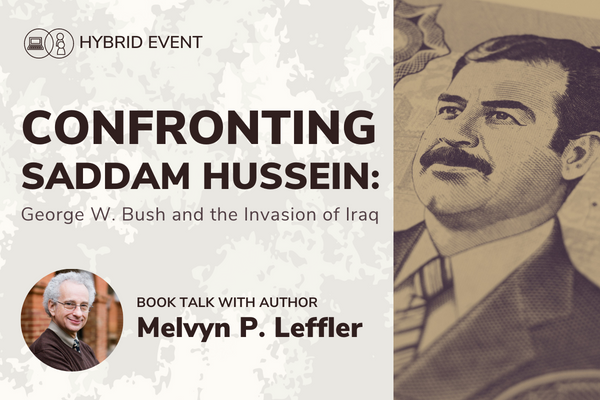
Registration
The Mershon Center for International Security Studies welcomes Melvyn P. Leffler on March 23, 2023. Leffler is the Edward Stettinius Emeritus Professor of American History at The University of Virginia.
America's decision to go to war in Iraq in 2003 is arguably the most important foreign policy choice of the entire post-Cold War era. Nearly two decades after the event, it remains central to understanding current international politics and US foreign relations.
In Confronting Saddam Hussein, the eminent historian of US foreign policy Melvyn P. Leffler analyzes why the US chose war and who was most responsible for the decision. Employing a unique set of personal interviews with dozens of top officials and declassified American and British documents, Leffler vividly portrays the emotions and anxieties that shaped the thinking of the president after the shocking events of 9/11. He shows how fear, hubris, and power influenced Bush's approach to Saddam Hussein's Iraq. At the core of Leffler's account is his compelling portrait of Saddam Hussein. Rather than stressing Bush's preoccupation with promoting freedom or democracy, Leffler emphasizes Hussein's brutality, opportunism, and unpredictability and illuminates how the Iraqi dictator's record of aggression and intransigence haunted the president and influenced his calculations. Bush was not eager for war, and the decision to invade Iraq was not a fait accompli. Yet the president was convinced that only by practicing coercive diplomacy and threatening force could he alter Hussein's defiance, a view shared by British Prime Minister Tony Blair and other leaders around the world, including Hans Blix, the chief UN inspector. Throughout, Leffler highlights the harrowing anxieties surrounding the decision-making process after the devastating attack on 9/11 and explains the roles of contingency, agency, rationality, and emotion. As the book unfolds, Bush's centrality becomes more and more evident, as does the bureaucratic dysfunctionality that contributed to the disastrous occupation of Iraq.
A compelling reassessment of George W. Bush's intervention in Iraq, Confronting Saddam Hussein provides a provocative reinterpretation of the most important international event of the 21st century.
Speaker

Melvyn P. Leffler is the Edward Stettinius Emeritus Professor of American History at The University of Virginia. He is the author of several books on the Cold War, including For the Soul of Mankind (2007), which won the George Louis Beer Prize from the American Historical Association, and A Preponderance of Power (1993), which won the Bancroft, Hoover, and Ferrell Prizes. In 2010, he and Odd Arne Westad co-edited the three volume Cambridge History of the Cold War. Leffler was the Harmsworth Professor at Oxford in 2002-3, and previously served as president of the Society of Historians of American Foreign Relations. Princeton University Press published a collection of his essays and articles in 2017, called Safeguarding Democratic Capitalism: U.S. Foreign Policy and National Security, 1920-2015. His new book, Confronting Saddam Hussein: George W. Bush and the Invasion of Iraq, will be published by Oxford University Press in March 2023.
